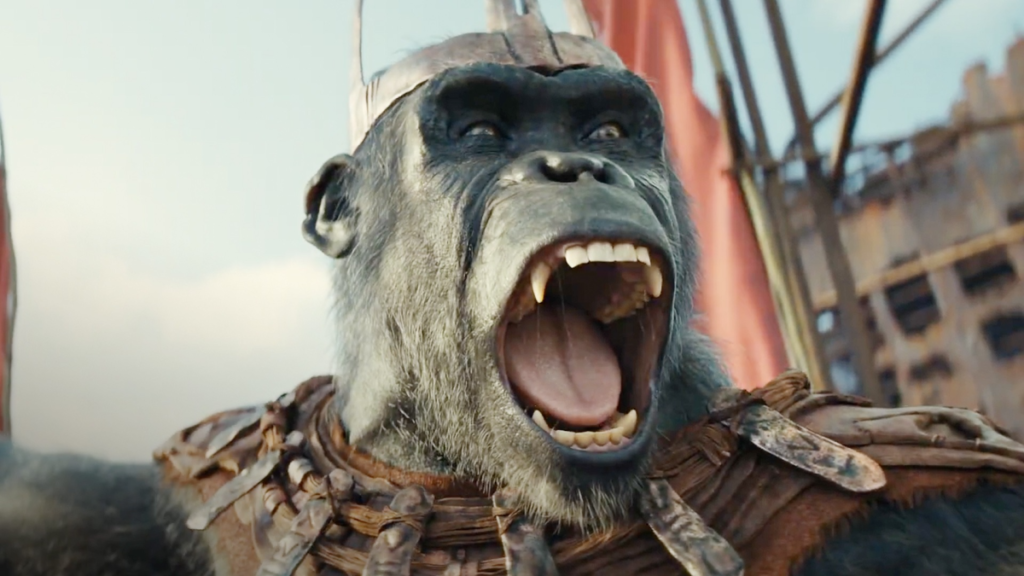
Kingdom of the Planet of the Apes
Kingdom of the Planet of the Apes ushers in a new chapter in the storied franchise, continuing the saga that has captivated audiences for decades with its thought-provoking exploration of intelligence, power, and survival. Directed by Wes Ball, this latest installment carries the torch from the acclaimed trilogy that reinvigorated the series, taking us deeper into a world where apes have risen to dominance, and humans struggle to survive in the shadows of their once-great civilization.
Set years after the events of War for the Planet of the Apes, the film presents a society where apes have established their own thriving civilization, structured around principles of equality and respect for all species—at least in theory. But beneath this surface of peace, tensions simmer, and new conflicts are on the horizon as the kingdom faces external threats and internal power struggles.
At the heart of the story is Caesar’s son, Cornelius (portrayed by Owen Teague), who must step into his father’s monumental legacy while forging his own path in a rapidly changing world. Teague delivers a nuanced performance, capturing Cornelius’s internal battle between the ideals instilled in him by Caesar and the harsh realities of leadership. Cornelius is a reluctant leader, still haunted by the loss of his father and the weight of expectations placed upon him. Through Teague’s portrayal, Cornelius emerges as a complex character—wise beyond his years but also burdened by self-doubt, a leader torn between maintaining peace and preparing for inevitable conflict.
The film introduces a new human character, played by Freya Allan, whose journey intertwines with that of the apes in unexpected ways. As one of the few surviving humans who remember a time before the apes’ rise to power, her character offers a poignant reminder of the lost human world and serves as a bridge between the two species. Allan brings depth and empathy to her role, portraying a character who is both a survivor and a seeker of reconciliation, embodying the possibility of a fragile peace between humans and apes.
Wes Ball, known for his work on The Maze Runner series, brings a fresh visual style to the franchise while honoring the aesthetic that fans have come to expect. The film’s world-building is nothing short of spectacular, with stunning visual effects that bring the ape civilization to life in vivid detail. From towering treehouse cities to the sprawling ruins of human metropolises now overtaken by nature, every frame is rich with atmosphere and texture. The apes themselves are rendered with incredible realism, their expressions and movements so lifelike that it’s easy to forget they are the product of CGI wizardry.
One of the most compelling aspects of Kingdom of the Planet of the Apes is its exploration of the challenges that come with establishing a new society. The apes, now the dominant species, must grapple with questions of governance, justice, and the treatment of the remaining humans. These themes resonate deeply, reflecting the complexities of any emerging civilization, particularly one built on the ashes of another. The film doesn’t shy away from showing the cracks in the ape society, where idealism clashes with the realities of maintaining power and order.
The story also delves into the evolving dynamics between different factions within the ape community. As the kingdom expands, differing ideologies begin to surface—some apes advocate for continued peaceful coexistence with humans, while others, scarred by past conflicts, see humans as a lingering threat that must be eradicated. This internal strife is personified by a powerful new antagonist, an ambitious gorilla general named Vulcan, played with imposing presence by Djimon Hounsou. Vulcan’s character challenges Cornelius’s leadership, pushing the narrative towards a dramatic confrontation that will determine the future of both species.
The score by Michael Giacchino, who also composed the music for the previous films, once again elevates the emotional stakes. His compositions blend haunting melodies with stirring, epic themes that perfectly complement the film’s sweeping visuals and intense drama. The music adds layers of emotion to the narrative, whether it’s the quiet moments of reflection or the pulse-pounding sequences of battle.
While Kingdom of the Planet of the Apes excels in its storytelling and visual spectacle, it’s not without its challenges. The film’s pacing, particularly in the first act, is deliberate, taking its time to reintroduce audiences to the world and its characters. While this slow burn allows for rich world-building and character development, it may test the patience of viewers eager for action. However, once the film picks up momentum, it delivers with thrilling set pieces and a gripping finale that more than makes up for the slower beginning.
Ultimately, Kingdom of the Planet of the Apes is a worthy continuation of the franchise, offering a story that is both epic in scope and intimate in its exploration of leadership, legacy, and the ever-fragile balance between war and peace. It’s a film that challenges its characters and its audience to consider what kind of world we want to build, and what sacrifices must be made to preserve it. For fans of the series, this is a must-see, and for newcomers, it offers a compelling entry point into a world where the lines between humanity and animalistic survival are increasingly blurred.

